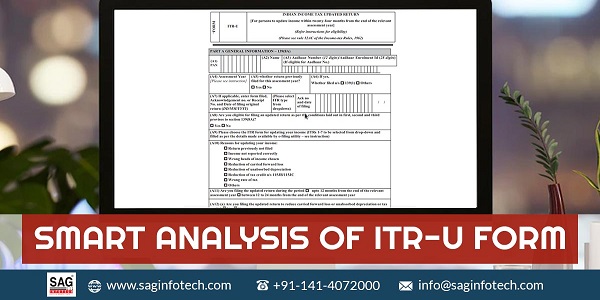Nirmala Sitharaman announced in Budget 2022 that taxpayers may now file Updated Income Tax Returns (ITR-U). The Finance Bill 2022 introduced subsection 8A to section 139 of the Income Tax Act, which allows taxpayers to file an Updated ITR if their earlier ITR contains omissions or errors.

What does the term Income Tax Updated Return (ITR-U) define?
The Central Board of Direct Taxes (CBDT) has reported a new Rule 12AC and a new Form ITR-U that would be needed to be furnished including the separate ITR, to furnish an updated return.
In the form ITR-U, the taxpayer is required to show the amount of the other income beneath the mentioned income heads where the other tax is needed to get filed. No detailed income breakup is required to be shown such as in the case of filing regular ITR forms. The taxpayer should mention the exact cause for filing the updated return in ITR-U. Moreover the same would be needed to specify the information of the challan for the other tax filed for the updated return.
Who must furnish ITR-U (Income Tax Updated Return) Form?
Any individual must be qualified to update the return for the FY 2019-20 and the next assessment years according to the related provisions of the IT act could furnish the updated return through Form ITR-U. Only one updated return for each assessment year can be filed by an assessee.
When does this provision come into force?
1st April 2022
What is the last date mentioned for filing the updated return that is ITR-U?
Under Section 139(8A) of the Income Tax Act, an assessee could furnish an updated income tax return within 24 months from the finish of the related assessment year. The circulation of the notice of CBDT articulated that the assessee could file an updated Income Tax return from AY 2020-21.
For instance – From the date 31st March 2023, the assessee could furnish an updated ITR within 24 months for FY 2021-22 i.e AY 2022-23. Hence 31st March 2025 will be the last date for filing the ITR-U for AY 2022-23.
There is only one chance provided to the assessee for filing the updated ITR u/s 139(8A) once the time limit for filing Original ITR u/s 139(1), Revised ITR u/s 139(5) or Belated ITR u/s 139(4) has expired.
Who are not eligible to file the updated return?
The assessee will not file the updated return if search proceedings are executed to him for the related assessment year, the same shall not furnish the updated return. Also, the assessee would not furnish an updated return even if the assessment/reassessment/revision/re-computation would be due or finished for the related assessment year.
Indeed the act would not permit the assessee to furnish the updated return when there would be no other tax outgo. Thus if the total tax liability would get diminished the losses to be managed to the income, refund, or rise in the refund amount would be there, and the assessee could not file.
Procedure to file ITR-U (Income tax updated return) Form
Part A: General Information-139(8A)
According to section Section 139(8A) of the Income Tax Act, an assessee who would furnish the original Income tax return beneath section 139(1), amended Income tax return beneath section 139(5), late ITR under Section 139(4) or not furnished ITR could file ITR-U i.e. Updated ITR under Section 139(8A) within 24 months from the finish of the pertinent assessment year.
For the below-mentioned cases, the assessee would not furnish an updated income tax return:
- Reporting losses
- Through the updated returns the total tax liability shown before get
diminished. - An updated return will be directed to a refund or rise in the refund
claimed before.
Form of ITR-U Updated Return
Penalty on Filing Updated Return, Pay Additional Tax beneath Section 140B of the Income Tax Act
The assessee furnishing the updated return should be required to submit proof of the tax payment and the penalty according to section 140B of the income tax act.
Case 1: No ITR filing before
If the assessee would not furnish the Original ITR beneath Section 139(1), Revised ITR under Section 139(5), or Belated ITR under Section 139(4), he/she should furnish the below items:
- Tax Dues with interest beneath Section 234A, 234B, 234C
- A late fee beneath Section 234F for the late ITR filing
But these assessees could avail of the credit towards the Advance Tax, TDS, TCS, and Relief under Section 89, 90, 90A, 91 115JAA or 115JD.
Case 2: Would furnish ITR before
If the assessee would furnish the original ITR beneath section 139(1), amended ITR beneath Section 139(5), or Belated ITR beneath Section 139(4), he/she will need to pay the tax:
- The tax upon the other income engaging the interest after diminishing
the interest already furnished before. - Other taxes





